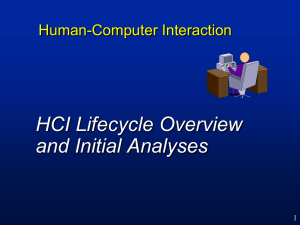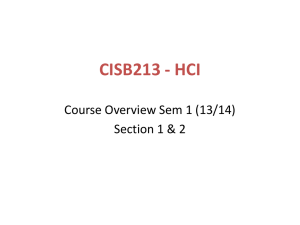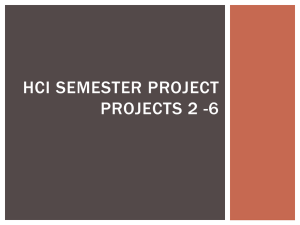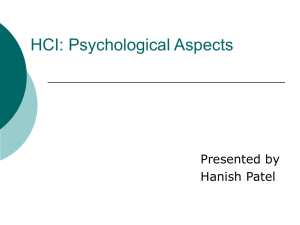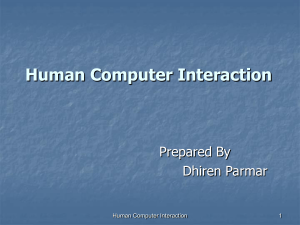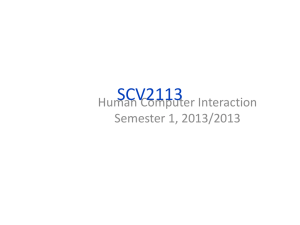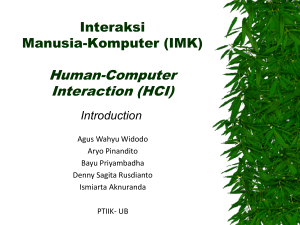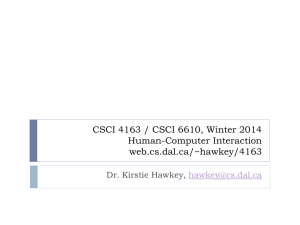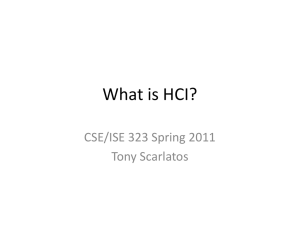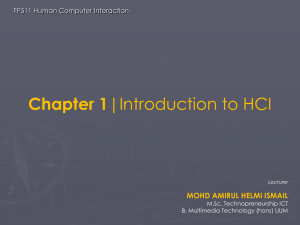IS573 - Human-Computer
advertisement
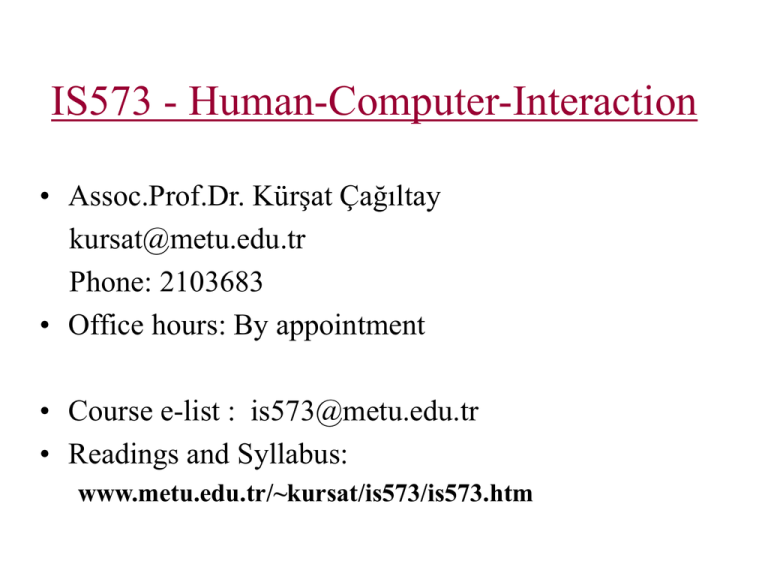
IS573 - Human-Computer-Interaction • Assoc.Prof.Dr. Kürşat Çağıltay kursat@metu.edu.tr Phone: 2103683 • Office hours: By appointment • Course e-list : is573@metu.edu.tr • Readings and Syllabus: www.metu.edu.tr/~kursat/is573/is573.htm From the Syllabus • This course will provide students with a sound introduction to the discipline of HCI and examine the issues of human factors and the design of computer application interfaces. • We will have a more psychological and social focus rather than a technical one. • It will be organized around a collection of readings (>1000 pages) and real-world exercises concerned with applying HCI research to the design of computer interfaces. Student Requirements • This course has no prerequisites. • The only requirement is reading (a lot of), writing, discussing and conducting research. • Students’ primary responsibilities will be making weekly readings, critiquing and analyzing them, finding related case studies/hands-on experiences, and organizing and participating class discussions. • This series of integrated exercises, both in-class and outside of class time, will link with concepts covered in lectures and readings Grading (Tentative) Good news: No exams Library Journal Analysis = 5 Design diaries report (3 items) = 10 Design diaries presentation (1 item) = 5 pts Usability tests (Heuristic and End User) = 20 pts • Term Paper = 40 pts • Term Paper presentation = 10 pts • Participation/Presentations-Quiz = 10 pts • • • • • Weekly Topics - 1 • What is HCI and why is it important? • From interface to interaction: views, frameworks and lessons • What is a good user interface: Guidelines, Styles, and Evidence • Usability engineering • Evaluation strategies for usable interface design: Heuristic Evaluation and Cognitive Walkthrough • Beyond usability engineering: Understanding the user (part 1) Human Cognition (Interaction and Psychology) Weekly Topics - 2 • Understanding the user (part 2) Individual differences: Personality, Disabilities , anxiety, and age. • Understanding the user (part 3) Human Capabilities: Learning, errors, and training • The environment of use: implementation and resistance of new technology • The Design Process (part 1): Improving technology through User-Centered Design • The design process (part 2): Understanding how designers think • Ethics in the design of information systems for users • Case studies Usable or not usable? • • • • • Do you have any device with a chip in it? Let’s talk about it, share your experiences Good design? Problems and implications How to fix it? Easy to say, Hard to Realize • 2002 First HCI course at METU • 2006 First HCI lab with Eye-tracking in Turkey Reference: As we may think, The Atlantic Monthly, July 1945 http://www.theatlantic.com/doc/194507/bush TUBITAK Vizyon 2023 Report • 1. Kullanımı eğitim gerektirmeyen bilgisayarların geliştirilmesi. • Bilgi çağında yaşamanın gereği olan “bilgisayar okur-yazarlığı”, günümüzde en çok sözü edilen yeteneklerden birisi. Genç kuşaklar bilgisayarla barışık bir biçimde yetiştirilecek, böylece birçok alanda bilgisayar kullanımının önü açılacak. Ne var ki nüfusu giderek yaşlanan AB’de, öğrenme yeteneği zayıflamış, yaşlı insanların çokluğu ve bunların BİT olanaklarıyla örülen yaşam tarzları nedeniyle, bilgisayar kullanmaya giderek daha bağımlı duruma gelmeleri, çözümü ters yüz etme düşüncesini getirmiştir: “İnsanlar bilgisayara ayak uyduracağına, bilgisayarlar insanlara ayak uydurmalı; bir başka deyişle, “insan okuryazarlığı” olan bilgisayarlar yapılmalı”. Hem yaşam düzeyine, hem ulusal katma değere katkısı olacağından, bilgisayarı “akıllı” kılacak olan yazılım ve donanımların ülkemizde tasarlanması, üretilmesi ve ayrıca dışsatımı hedeflenmektedir. (Sayfa 73) • http://vizyon2023.tubitak.gov.tr/Strateji_Belgesi-V211.pdf So, in 573 my purpose is, • Create a paradigm change – designers must feel guilty if they create bad designed products – Users mustn’t suffer anymore Papers will be presented…. • Annual Conference of HCI • Will be open to public • I expect you publish it in a journal or an international conference • Some of previous years’ projects were presented at: – – – – – – E-learn conference, 2003 Phoenix AZ San Diego International Systems Conference, 2005 TBD 21. Ulusal Bilisim Kurultayi, Ankara, 2004 HCI International 2005, Las Vegas HCI International 2007, China 29th International Conference on Information Technology Interfaces, 2007,Hırvatistan – And others....... New: METU HCI Lab • To design, utilize, and evaluate interactive technologies like web sites and other computer software • Eye tracking device • We will have a tour and you will use it Readings • For the first week – www.metu.edu.tr/~kursat/is573/is573.htm • Following weeks PDF docs under NetClass – Visit “Lecture Notes” section Last Thing: An Unpleasant Topic • Remember the story of Nasreddin Hoca – Before you broke the cup, I will beat you. • Plagiarism http://www.indiana.edu/~istd/overview.html – Take the tutorial – Take the test • WARNING! Plagiarism = F (Satisfaction)
